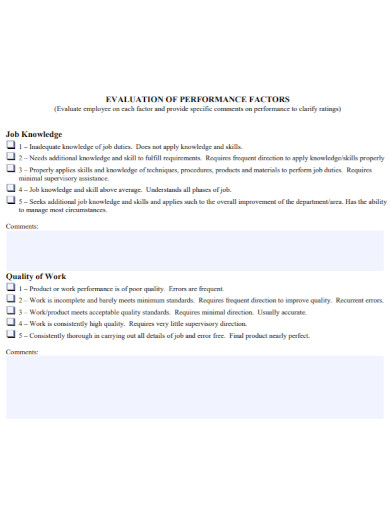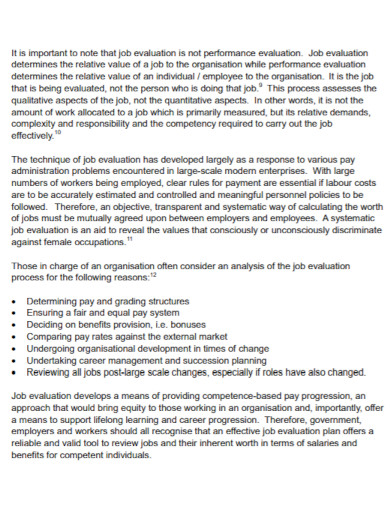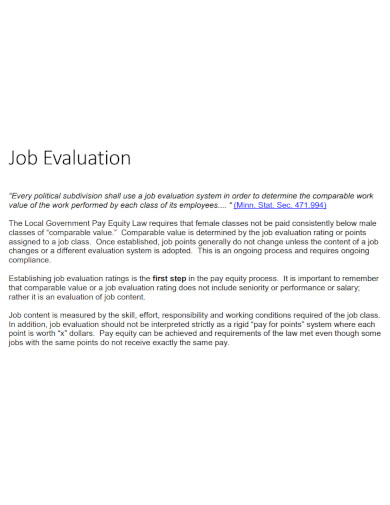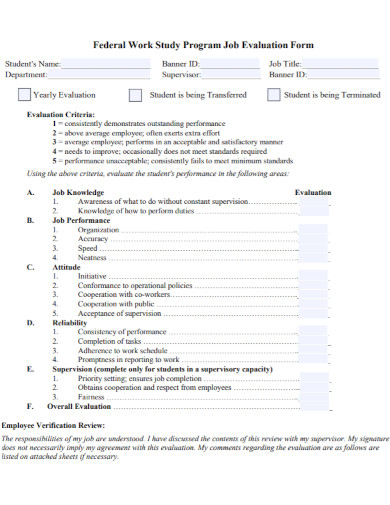Job Knowledge Evaluation Examples
Picture this common scenario: You have an interview later today for a job you are hoping to get. You believe yourself ready but in the end, you failed. It is never easy getting work with no idea about what you are applying for. This is usually true for fresh graduates or even those who may already be an expert in the field. There are times that we may forget what we applied for due to a lot of reasons, but did you know that getting even just a little bit of knowledge of the job you are applying for can matter? This is one of the reasons why a lot of candidates fail their initial interviews since they have no idea as to what they are applying for and would simply take a leap of faith. But even a leap of faith would not be something people should depend on. If you are curious as to how interviewers evaluate you, check out 3+ job knowledge evaluation examples in PDF right now.
3+ Job Knowledge Evaluation Examples
1. Job Knowledge Evaluation of Performance
2. Job Knowledge Evaluation Template
3. Formal Job Knowledge Evaluation
4. Job Knowledge Evaluation Form
What Is a Job Knowledge Evaluation?
A job knowledge evaluation is a kind of assessment that the interviewer does to evaluate a candidate who is applying for the job position. The evaluation simply measures the candidate’s knowledge of the job and if the skills they have are essential for the position they are applying. In any case, a job knowledge evaluation also lets the interviewer see if the candidate has any given or general knowledge of what they are applying for. As experience is not only a key factor to getting that job, so is having enough knowledge and skill to match it with.
The purpose of an interviewer to do a job knowledge evaluation is to be able to assess the candidate. To see if the skills, and the experience match with the job description. To check if the candidate has any idea or knowledge of the job they are applying for. Another purpose of a job knowledge evaluation is to see through the candidate‘s point of view if they have the exact skills, knowledge and experience if it is applicable for the job they are applying for, or for the position they are applying for. In addition to that, it also helps the interviewer and the employer see if the skills and experience are enough for the candidate to get the job position. As not all candidates who may possess the knowledge and skills are capable of handling the job. It is the same as those who may not have the experience but they are trainable enough for the job.
How to Write a Job Knowledge Evaluation?
As we all know, a job knowledge evaluation is an important factor to an interviewer. It is an important factor for an employer to check and to see if the candidate is suitable for the role they are applying for. But to be able to get that, one must know how to do an evaluation. By understanding what should be placed in a job knowledge evaluation, everything would run smoothly. So check out the following tips below to see what should be added and what should be avoided in a job knowledge evaluation.
1. Rate the Applicant
Place the rating in different categories when you are planning on rating the applicant. Each number rating must have a significant meaning to it. It is unheard of to simply rate them with a number without the significant description placed in the rating.
2. Correct Information
Give out the correct information of the applicant as well. This is also necessary since the evaluation form would be a part of your files. To avoid any problems, always ask the candidate for their information, especially if you are not sure or you wish for them to repeat what they may have said.
3. Place General to Specific Descriptions
Each number ranging from 1 to 5 or how you may want it to be must always be given a description. This also helps when you want to know which rating would fit the candidate. It is also expected as any other kind of evaluation that each number must at least have a description in place. Rather than to assume which number means best or worse.
4. Write Your Review
Your review on the applicant must be based on the rating you have given. This is why the rating is also as important as the overall evaluation and review is based on how you give out the rating for the candidate. Your review must be in a professional manner and tone. Watch how you write your review as this can also affect the candidate.
5. Add Positive and Negative Reviews
As you write down your review, don’t add only positive reviews. You may add some needs improvement or negative reviews. Watch how you may write the reviews as anyone may be able to read them. Avoid writing too much negativity as well as too much positive. Find a way to make them all even.
FAQs
Is a job knowledge evaluation necessary?
Yes. A job knowledge evaluation is necessary when you are planning on evaluating a candidate. It is necessary to know how much the candidate knows about what they are applying for and if they have the necessary ideas and skills to match.
What should be avoided when writing the evaluation?
Avoid writing difficult jargon as well as putting the candidate down. There are ways on writing that the candidate may understand, as long as you avoid saying painful words when describing what happened in the interview.
Who is the audience of the evaluation?
The main audience of the evaluation is your employer and the candidate. There are some companies who would let the candidate know their evaluation. Be careful on how you may want to word out your review if you want your candidate to read their evaluation.
Writing out evaluations for candidates sounds easy enough. All you have to do is to rate the person based on the subjects and subtopics found in the evaluation. However, you must also be careful on how you want to word out your review and evaluation. Your employer trusts you on how you rate the candidate, and one small slip may cause a lot of problems.






